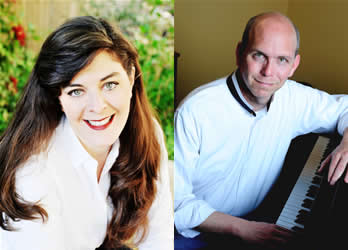An unusual and magnificent sound was heard from the Dana Auditorium stage Wednesday night at the Eastern Music Festival: voices. In the five weeks that comprise the festival held at Guilford College, very few performances incorporate singing, but Wednesday night’s concert took some steps to rectify the situation. Mozart’s Missa brevis in F, K. 192 (written by the composer when he was 18 years old) and Requiem, K. 626 (unfinished at the time of his death in 1791) featured both a 40-voice choir and chamber orchestra.
The evening opened with the youthful work – a 25-minute setting of the Catholic Mass. Vigor energizes much of the work, as in the opening Kyrie. The most obvious influence for the work is Handel, although the voice of a young Mozart is clearly in evidence. Great passages of independent lines alternate with hymn-like singing from the choir.
UNCG professor Carole Ott masterfully led the forces from the podium. The choir, obviously well prepared by Ott, responded to her fluid and elegant gestures, and the orchestra masterfully accompanied the singing. For the most part, the choir sang with confidence and passion although there were moments of tentative singing, as in the opening of the Gloria. Four able soloists from the choir were heard throughout the proceedings: Felicia François (soprano) Laura Buff (mezzo-soprano), Sean Lucier (tenor) and Lesly Dumé (baritone).
Although the Mass, a product of the Enlightenment, is imbued with many Mozart stylistic traits, it does not really predict the communicative power that the composer was to harness in his later years. And nowhere is that power more evident than in the Requiem, a profound composition that contains some of Mozart’s most tender and dramatic writing.
EMF Music Director Gerard Schwarz, who took full advantage of the power of the score to provide a symphonic sweep of the 55-minute work, led the performance. From the opening pulsating strings that accompany the two basset horns (magnificently played by Kelly Burke and Anthony Taylor), until the choir solemnly enters, Schwarz brought out the dramatic nuances inherent in the score.
The choir (again prepared by Ott) responded to the Maestro’s passion by offering heart-felt, emotional singing. Although orchestra and chorus were not always together, as In the Kyrie, the musical tension was often palpable. Schwarz jumped directly from the end of the Kyrie into the powerful “Dies irae” to incredible effect.
Other wonderful moments include the great trombone solo (unerringly played by Mike Kris) that opens the “Tuba mirum.” The movement is a showcase for the four superb soloists. Baritone Craig Phillips provided a powerful, rich timbre. Tenor Matthew Plenk‘s stentorian voice was up next, then mezzo-soprano René Tatum and soprano Diana Heasty. To this listener, Schwarz sometimes over-conducted when the quartet was singing without the choir; however, ensemble between the four was terrific.
Tatum’s sumptuous voice began the gorgeous “Recordare,” with other members of the quartet quickly joining in. Phillips solidly grounded the quartet with Plenk adding his hardy singing. Heasty’s beautiful voice, first heard in the Introit, provided soaring counterpoint.
At the forceful fugal conclusion of the Requiem, Schwarz held the attention of the large audience and moved directly into a lovely presentation of Mozart’s final motet, “Ave verum corpus,” which provided for a soft landing to an evening of exalted singing.











